Did you know a burst pipe can release up to 250 gallons of water per minute? This can cause huge damage to your property. It shows how important it is to take care of your plumbing ahead of time1.
In commercial plumbing, the risks are even bigger. Plumbing problems can quickly get out of hand, leading to big financial losses and stopping your business. It’s key to act fast, as every minute can mean thousands of dollars in damage1.
To protect your property and money, knowing common plumbing issues is key. Getting regular checks from experts can find problems early, saving you from expensive fixes later2. Also, using less water can lower your bills and help the environment2.
For commercial plumbing systems, following rules is crucial to avoid problems and health risks. Having emergency plumbers ready to help 24/7 can quickly fix issues, reducing damage and downtime1.
Table of Contents
Key Takeaways
- Regular professional inspections are essential for early problem detection
- Water-saving habits reduce bills and support environmental conservation
- Prompt response to plumbing emergencies is crucial, especially in commercial settings
- Proper tools and safety measures are important for DIY plumbing tasks
- Emergency plumbers play a vital role in preventing extensive property damage
Understanding Common Plumbing Issues
Plumbing problems can happen without warning, causing stress and expensive fixes. Let’s explore some common issues homeowners face and how to catch them early.
Burst Pipes: Causes and Consequences
Burst pipes are a homeowner’s worst nightmare. They can be caused by freezing, corrosion, or high water pressure. The damage can be huge, flooding your home quickly and damaging walls and floors3.
To avoid this, insulate pipes in cold spots and keep your home warm in winter.
Sewer Line Backups: A Messy Problem
Sewer backups are serious and need quick action. They’re often caused by blockages or tree roots getting into the sewer. These problems can make your home uninhabitable and need professional cleaning3.
If you notice slow or clogged drains, it might mean sewer line issues4. Regular septic tank maintenance can help prevent backups.
Water Heater Failures: Silent Threats
Water heater problems often go unnoticed until it’s too late. Sediment buildup, corrosion, or lack of maintenance can cause leaks or breakdowns. Getting your water heater checked annually can save you thousands in emergency repairs3.
Watch for signs like rusty water or strange noises from your heater.
| Plumbing Issue | Potential Waste/Damage |
|---|---|
| Running Toilet | Up to 200 gallons per day4 |
| Leaky Faucet | 5-20 gallons daily3 |
| Burst Pipe | Extensive home flooding3 |
Knowing about these common plumbing issues can help you spot problems early and act fast. Remember, prevention is the best way to avoid expensive plumbing disasters.
The Importance of Regular Maintenance
Regular plumbing maintenance is key to avoiding expensive problems. A well-kept system works better, saving money in the long run5. By taking care of your plumbing early, you can make it last longer and avoid frequent replacements5.
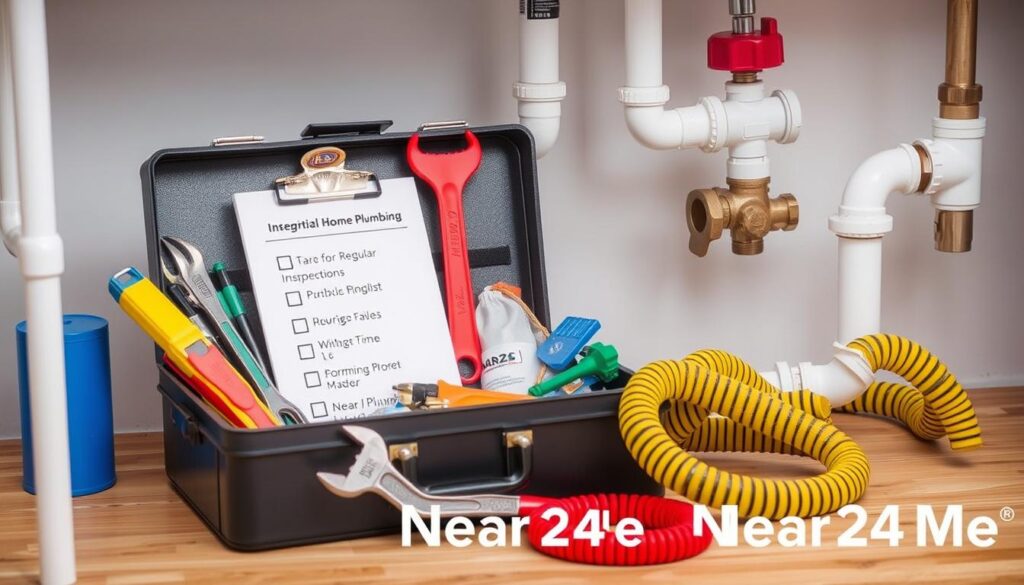
Regular checks are vital for keeping plumbing in good shape. They spot problems early, so you can fix them quickly56. This saves money and keeps everyone safe.
“An ounce of prevention is worth a pound of cure.” – Benjamin Franklin
Commercial places have special plumbing needs because of their systems and water use6. Plumbers use new tools like thermal imaging to find leaks6. Regular checks stop water leaks, a big problem in commercial buildings.
| Maintenance Task | Frequency | Benefits |
|---|---|---|
| Drain Cleaning | Monthly | Prevents clogs and ensures smooth operation |
| Water Heater Service | Annually | Extends lifespan and optimizes performance |
| Fixture Inspection | Quarterly | Identifies leaks and maintains efficiency |
| Professional Inspection | Annually | Ensures regulatory compliance and safety |
Starting a preventive maintenance program is crucial. It catches small problems before they get big6. This makes your system work better and keeps you safe5. By focusing on regular maintenance, businesses can save money and feel secure.
Protecting Your Pipes from Freezing
Winter can be tough on your plumbing. Frozen pipes often burst, causing expensive damage7. We’ll look at ways to keep your pipes safe from the cold.
Insulation Techniques for Exposed Pipes
Insulating your pipes is key. It stops heat loss, lowers freezing risk, and prevents bursts7. Polyethylene is top for keeping pipes warm and dry7. For hot pipes, mineral wool insulation works well7.
Proper Temperature Control in Cold Weather
Water in outdoor pipes freezes at 32°F. At 20°F, pipes inside buildings can freeze7. In cold areas, pipes are often kept warm to avoid freezing8.
Keeping your thermostat up at night helps prevent pipes from freezing8.
The Role of Heat Tape in Pipe Protection
Heat tape is great for extreme cold. Use insulation or heat cables that control temperature and are UL listed8. This is especially good for pipes in exterior walls, which freeze easily8.
Remember, proper pipe protection keeps pipes from freezing. It also makes your home safer and quieter7. With these steps, your plumbing will stay working even when it’s very cold.
Proper Waste Disposal: A Key to Healthy Plumbing
Proper waste disposal is key to a healthy plumbing system. Good habits can prevent clogs and extend your pipes’ life. Let’s look at some important practices for waste management and clog prevention.
In commercial kitchens, 85% of plumbing issues come from grease buildup9. Don’t pour fats, oils, or grease down the sink. These solidify in pipes, causing big blockages. Instead, throw them away in a container.
Public restrooms also face big challenges, with 60% of plumbing problems from non-flushable items9. This shows how crucial proper waste disposal is everywhere. Only flush toilet paper and human waste. “Flushable” wipes can clog pipes because they don’t break down fast.
In residential kitchens, use garbage disposals carefully. Don’t grind hard or fibrous foods, as they can damage the unit and clog pipes. Scrape plates before rinsing and compost food scraps when you can. This simple step helps prevent plumbing disasters.
“Prevention is better than cure. Proper waste disposal habits can save you from costly plumbing repairs down the line.”
Remember, regular drain cleaning can cut clogs by up to 70% in commercial places9. This is true for homes too. By following these waste disposal tips, you’ll keep your plumbing healthy and avoid expensive fixes.
Monitoring Water Pressure: Why It Matters
Keeping an eye on water pressure is vital for a healthy plumbing system. It makes sure appliances work well and saves you from expensive pipe and fixture damage. Let’s explore how to manage water pressure at home.
Ideal Water Pressure Ranges
The best water pressure for homes is between 40 and 60 PSI. Pressures outside this range can cause problems. Low pressure means slow sinks and weak showers. High pressure can damage pipes and cause leaks10.
Installing and Using Pressure Regulators
Pressure regulators are key for keeping water pressure right. They stop damage from too much pressure, like burst pipes and appliance breakdowns. Getting a pressure regulator is smart for those with high water pressure11.
Signs of High Water Pressure Problems
Watch out for signs of high water pressure at home. These include:
- Banging pipes (water hammer)
- Leaking faucets
- Constantly running toilets
- Unexplained increases in water bills
Fixing these issues quickly can stop bigger problems and save you money10.
Regular plumbing care, like checking water pressure, helps avoid big issues. Use a pressure gauge to check your water pressure often. If you keep having problems, get a pro plumber to check and fix things11.
Detecting and Addressing Hidden Leaks
Hidden leaks can cause a lot of damage to your home. They can lead to water damage and mold growth. In Anderson, IN, it’s important to find leaks quickly to avoid expensive repairs12. Knowing the signs of hidden leaks is the first step to prevent water damage.
Look out for these signs:
- Unexpected increases in water bills
- Musty smells or visible mold
- Stains or discoloration on walls and ceilings
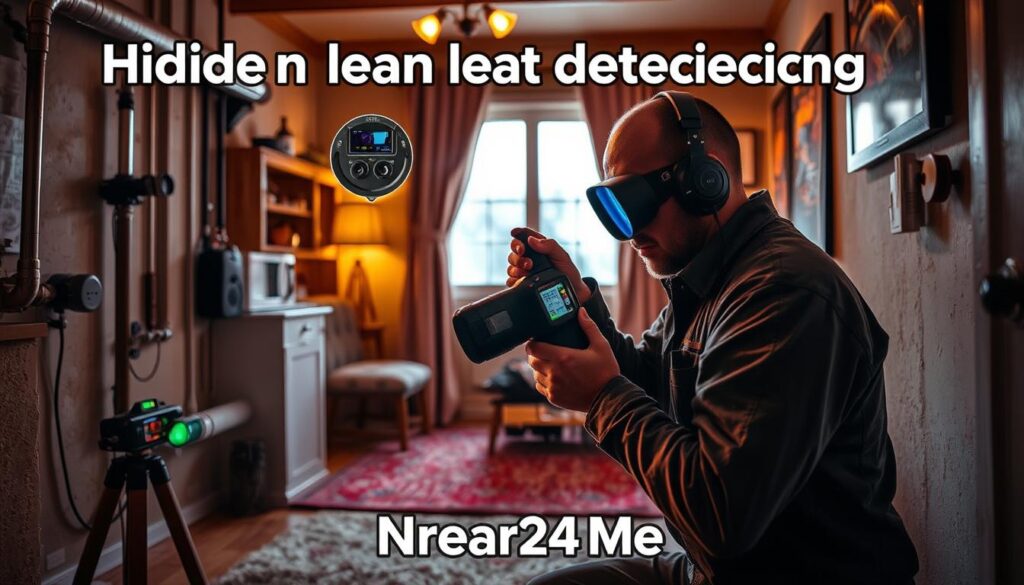
- Thermal imaging cameras find temperature changes in walls and floors
- Acoustic leak detectors find leaks by listening for water sounds
- Video pipe inspections look for problems in plumbing systems
These tools help find leaks fast and accurately1213.
Regular leak detection services are key to finding problems early. They help avoid expensive repairs and reduce water damage risk. Not finding leaks can also raise your water bills, making regular checks a good idea12.
For expert leak detection, consider a professional plumbing service. They have the skills, work efficiently, and guarantee their work. This ensures your plumbing system works well and protects against water damage1214.
| Common Leak Locations | Detection Methods |
|---|---|
| Service lines | Water meter tests |
| Inside walls and floors | Thermal imaging |
| Crawl spaces | Acoustic listening |
| Plumbing systems | Video inspections |
Smart Choices in Cleaning Products for Plumbing
Choosing the right cleaning products for your plumbing is key. Pipe-safe products keep your system healthy and long-lasting. Let’s look at smart choices that protect your pipes while keeping them clean.
Non-Corrosive Cleaners: Protecting Your Pipes
Non-corrosive cleaners are gentle yet effective. They remove buildup without harming your plumbing. Experts with nearly 40 years of experience suggest using these for regular upkeep15.
Natural Cleaning Solutions for Sinks and Drains
Natural solutions work well too. Vinegar and baking soda are top picks for eco-friendly cleaning. They’re safe for pipes and handle mineral buildup and minor clogs.
The Dangers of Chemical Drain Cleaners
Chemical drain cleaners can harm more than help. They can corrode pipes, causing leaks and expensive fixes. Plumbers with over 500 positive reviews warn against using them15.
| Cleaning Method | Pros | Cons |
|---|---|---|
| Non-Corrosive Cleaners | Safe for pipes, Effective cleaning | May be more expensive |
| Natural Solutions | Eco-friendly, Affordable | May require more effort |
| Chemical Drain Cleaners | Quick action on clogs | Can damage pipes, Harmful to environment |
By picking pipe-safe products and eco-friendly cleaners, you’re not just cleaning. You’re also protecting your plumbing. If problems persist, it’s wise to get expert advice from a professional plumber16.
Mastering Garbage Disposal Use and Maintenance
Garbage disposals are crucial for a clean kitchen. Taking good care of them keeps your kitchen running well and avoids plumbing problems. Here are some key tips for keeping your disposal in top shape.
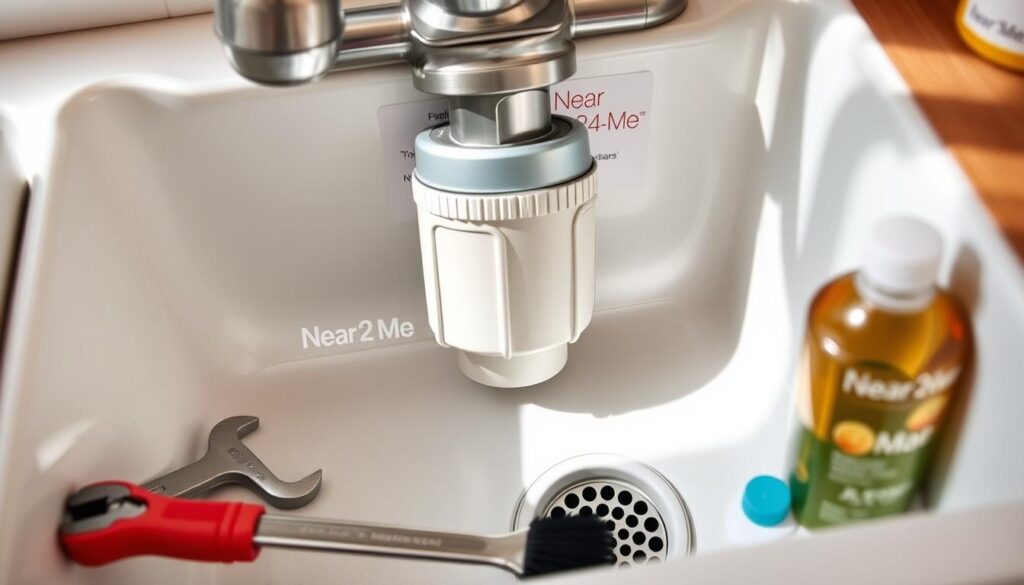
Keeping your disposal in good condition is essential. Always run cold water before, during, and after using it. This helps clear waste. Also, add food items slowly to avoid overloading the disposal.
Avoid putting hard foods, bones, and grease down the drain. These can cause clogs and harm your disposal.
To prevent odors and keep the blades sharp, try this:
- Fill the disposal with ice cubes
- Add a handful of salt
- Run cold water while grinding
This method keeps your disposal smelling fresh and working right. If you face tough problems, don’t hesitate to seek professional help. Craftsman Plumbing offers top-notch garbage disposal repair and installation services. They ensure quick and reliable fixes for any issues17.
| Do’s | Don’ts |
|---|---|
| Run cold water | Use hot water |
| Grind small food scraps | Dispose of fibrous foods |
| Clean regularly | Use harsh chemicals |
| Grind citrus peels for freshness | Overload the disposal |
By sticking to these tips, you’ll make your disposal last longer and keep your kitchen clean and efficient. Remember, proper disposal care is key to good plumbing health.
Commercial Plumbing Near Me: Finding Expert Help
Dealing with tough plumbing issues or regular upkeep is a big deal. You need reliable commercial plumbing services. Local plumbers for commercial places can tackle many problems, like water pipe damage, clogged drains, and low water pressure18.
These services include sewer and drain cleaning, water heater fixes, and full bathroom services. They also handle grease traps, backflow preventers, and more18. Commercial plumbing is more complex than home plumbing because of bigger projects and higher water damage risks19.
Looking for “commercial plumbing near me”? Keep these points in mind:
- Licensure and experience
- 24/7 emergency services
- Range of services offered
- Customer reviews and reputation
Many plumbing companies offer emergency services all day, every day. This is crucial for businesses facing sudden plumbing emergencies. They can fix urgent issues like burst pipes or water supply problems quickly19.
Regular upkeep is vital to avoid expensive repairs. Well-kept plumbing systems rarely break down, and maintenance is cheaper than emergency fixes20. Experts suggest checking septic systems every three to five years for best results18.
| Common Commercial Plumbing Issues | Frequency |
|---|---|
| Water pipe damage | High |
| Clogged drains | Very common |
| Low water pressure | Moderate |
| Toilet leaks | Common |
| Sewer odors | Occasional |
Plumbing problems in commercial areas can really hurt employee work and cause big losses beyond repair costs20. It’s key to focus on good commercial plumbing for safety and to avoid risks in places that make money18.
DIY vs. Professional Plumbing: When to Call the Experts
Homeowners can handle simple plumbing tasks like fixing clogged drains or replacing faucet washers. But, some jobs need the skills of a professional plumber21.
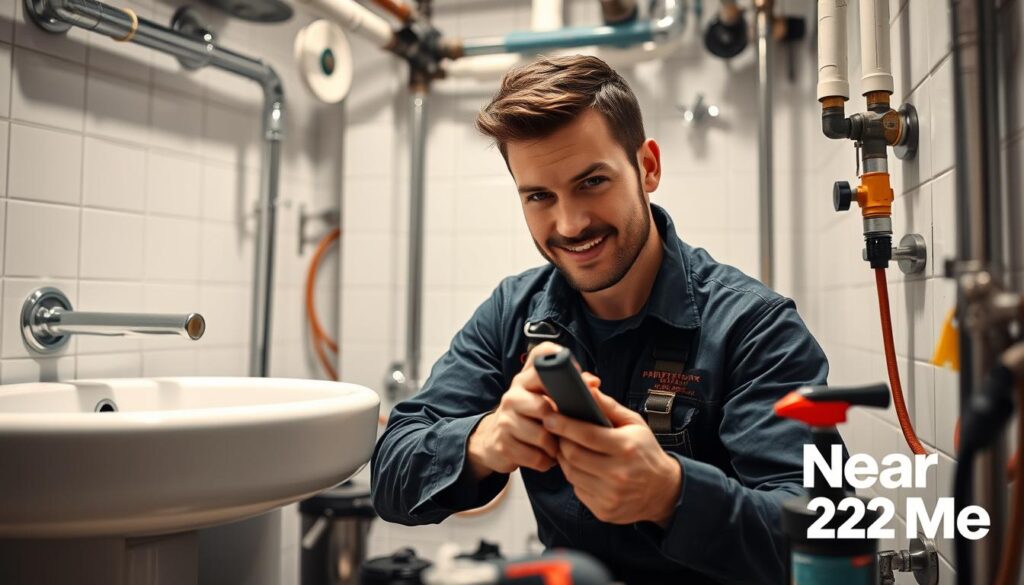
Signs you need a pro include main water, gas, or sewer line issues. Also, if you have multiple slow-draining fixtures or big water pressure problems. Professional plumbers are key for big changes to your plumbing system and for dealing with frozen pipes21.
For emergencies like a burst pipe or a toilet overflowing with sewage, turn off the main water supply and call a plumber fast22. If your water heater leaks, makes strange noises, or doesn’t heat water, you need a pro to check it out22.
While DIY fixes might save money for small problems, they can lead to bigger issues and costs. Professional plumbers offer long-term savings and ensure your plumbing works right. They have the skills to solve many plumbing problems efficiently21.
Recurring clogs or sudden water pressure drops might mean a bigger problem. These often need special tools and knowledge to fix right. Knowing when to call a professional can protect your home and save you from expensive mistakes.
Conclusion
To avoid plumbing disasters, you need to be proactive and follow expert advice. Regular checks by licensed plumbers help spot problems early2324. This is key in commercial places, where issues can impact many people and cost a lot2325.
Using your plumbing right and getting help fast are crucial. Businesses should keep up with inspections and maintenance2325. It’s important to pick plumbers who are licensed and ready to act quickly24.
While you can fix some small problems yourself, big ones need a pro. By following expert tips and staying alert, you can avoid expensive plumbing issues. Regular upkeep not only makes your plumbing last longer but also keeps things running smoothly, saving you money and stress23.

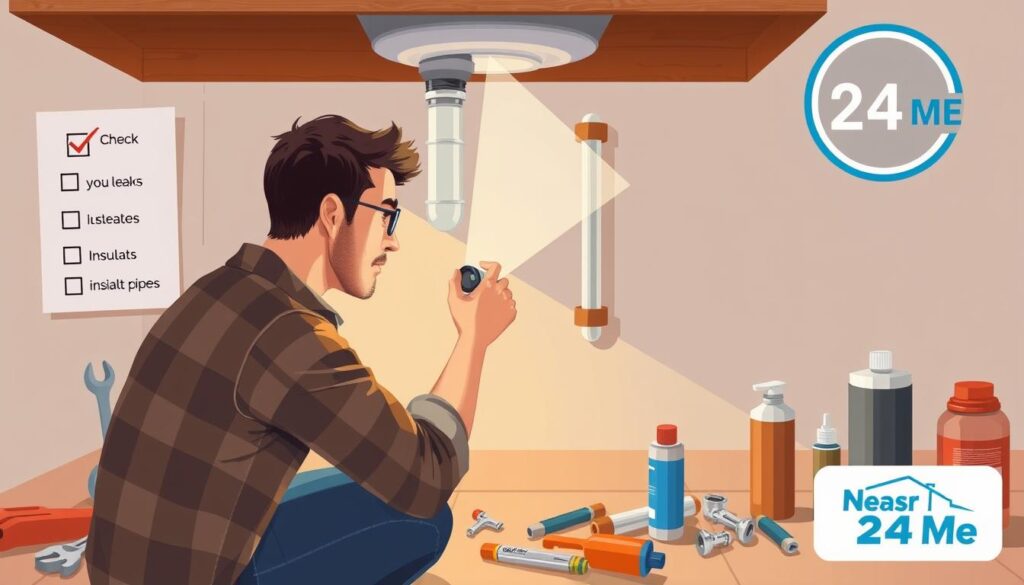




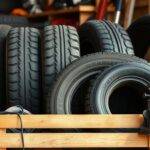

Thank you, your article surprised me, there is such an excellent point of view. Thank you for sharing, I learned a lot.